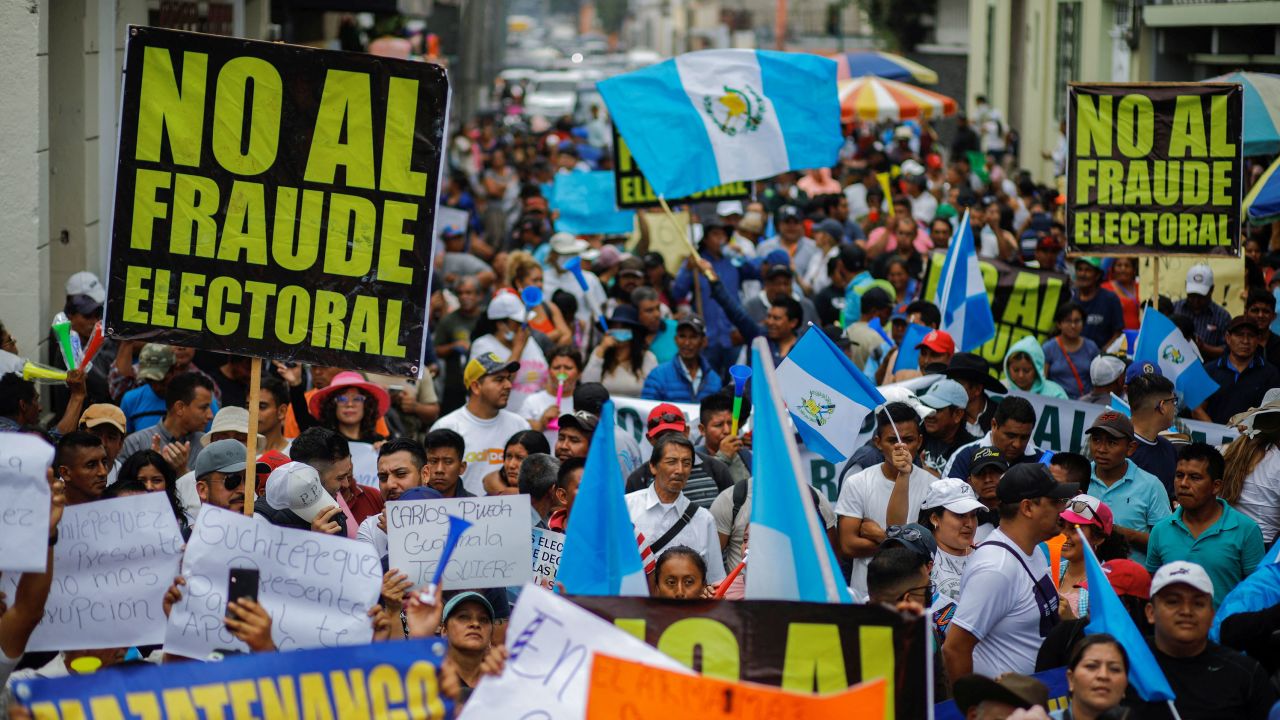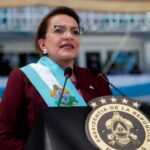
In a vote colored by the exclusion of some candidates as well as a crackdown on the press, center-left candidate Sandra Torres and centrist Edmond Mulet – both frontrunners – pointed to alleged irregularities at the polls in Central America’s most populous country.
“We have complaints they are buying votes” with the distribution of food, Torres said after voting at the Valle Verde school in the capital, Guatemala City.
Mulet said his camp received reports “about some kind of threats” as well as candidates offering money to voters.
“We hope that on this day all these doubts will be overcome and that the will of the people will be respected,” he said after casting his ballot.
Additionally, voters and members of the police and military clashed in San Jose del Golfo, 30 kilometers (18 miles) from Guatemala City, amid allegations the mayor unlawfully brought people from other districts to vote for outgoing President Alejandro Giammattei’s ruling party.
Giammattei himself is term-limited, and not running in this election.
Also up for election are 160 members of Congress, 340 mayors and 20 delegates to the Central American Parliament.
But many voters had already lost faith that the elections would bring about substantial changes.
“We woke up very early to vote. We vote with enthusiasm — and afterward, the presidents, it’s always the same thing,” voter Maria Chajon told AFP with resignation in her voice.
Nevertheless, the 53-year-old was one of the first in line at a polling station in San Juan Sacatepequez, a mostly Indigenous town about 20 kilometers west of the capital.
“All the institutions of the state, including the electoral process, are manipulated by groups in power linked to corruption and the traditional oligarchy,” said Edie Cux, director of the local branch of Transparency International, a German NGO that tracks perceptions of corruption.
Under the conservative Giammattei, several former prosecutors from the International Commission against Impunity in Guatemala (CICIG), a UN-backed entity closed by the government in 2019, have been arrested or forced into exile.
Earlier this month, the founder of a newspaper critical of the government was sentenced to six years in prison on charges of money laundering, a move decried by press freedom groups.
The country of 17.6 million is one of the poorest in Latin America, a reality that has, along with high rates of violent crime, compelled hundreds of thousands to risk the perilous migrant journey north toward the “American dream.”
Polls opened at 7:00 am (1300 GMT), and initial results are expected within hours of their 6:00 pm closure.
– Likely runoff –
In a pre-election poll by the Prensa Libre newspaper, Torres — the ex-wife of deceased former leftist president Alvaro Colom — was leading the race with 21.3 percent, followed by career diplomat Mulet at 13.4 percent.
In third place, with 9.1 percent, was right-winger Zury Rios, daughter of former military strongman Efrain Rios Montt.
Current polling suggests a high possibility that the election will go to a runoff on August 20, with no single candidate likely to obtain the 50 percent minimum share of votes required to win in the first round.
Two popular candidates — Carlos Pineda and Thelma Cabrera — had their candidacies invalidated by the Supreme Electoral Tribunal (TSE) in decisions their supporters have claimed amount to political sidelining.
According to the Prensa Libre poll, distrust in the TSE is high, with more than one in 10 respondents saying they intended to cast blank votes in protest.
“There are no options to improve the country, they are the same as always. The law allows me to vote null and that is what I am going to do,” lawyer Manuel Morales, 58, told AFP while waiting in line at a polling station on the southern outskirts of the capital.
– 4,274 murders –
Guatemala has one of the highest levels of inequality in Latin America, according to the World Bank.
Insecurity is another major election issue. Guatemala’s homicide rate is 17.3 per 100,000 inhabitants – about three times the world average, the UN says.
In 2022 there were 4,274 murders, half of them attributed to drug trafficking gangs.
Torres and Rios have both evoked the tactics of President Nayib Bukele in neighboring El Salvador in his controversial “war” on gangs which has won him adoration at home but opprobrium abroad over rights concerns.
AFP





